Mexico is a vibrant country filled with rich culture, delicious cuisine, stunning landscapes, and world-class historical sites. However, like any travel destination, it’s crucial to understand the safety precautions and tips for a secure and enjoyable journey. This article aims to shed light on the safety aspects of traveling to Mexico from various perspectives, offering you, the potential visitor, comprehensive insights.
Understanding the General Landscape
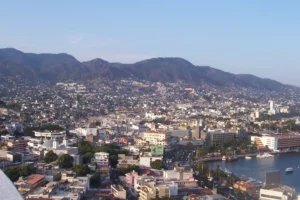
The first question that you might ask yourself is, “Is Mexico safe to visit?” The short answer is yes, but with some caveats. It’s essential to remember that its a vast country, and safety can vary from one region to another. Most tourists visit without any problems, but it’s always wise to stay informed and prepared.
The U.S. Department of State has a Travel Advisory System that categorizes countries based on their level of safety. As of the time of writing, Mexico is listed as Level 2: Exercise Increased Caution, primarily due to crime. This rating suggests that visitors should be extra vigilant, especially in certain areas known for higher crime rates.
Common safety concerns
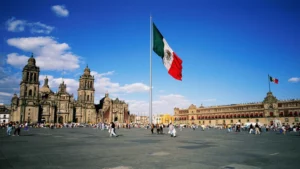
The following are the three most prevalent safety situations:
Petty Theft and Scams: Be vigilant about your belongings and avoid flashing expensive items. Be wary of scams such as unofficial tour guides or inflated taxi prices.
Food and Water Safety: Stick to bottled water and avoid street food unless you’re sure it’s clean. Food poisoning is a common issue among travelers in Mexico.
Healthcare: Mexico’s healthcare varies in quality. Major cities have excellent private hospitals, but rural areas may lack services. It’s recommended to have travel insurance that includes medical coverage.
Different Regions
Let’s dive deeper into different regions:
Tourist Areas (Cancun, Cozumel, Playa del Carmen, Tulum, and Mexico City): These places generally have a strong security presence due to their importance to the Mexican tourism industry. They are usually safe for tourists, with most incidents being petty crimes like pickpocketing or scams.
Border Areas: Some regions, particularly those along the U.S.-Mexico border, have higher crime rates due to drug trafficking activities. However, the cities of Tijuana, Mexicali, and Ciudad Juarez have seen significant improvements in recent years.
Rural Areas: While rural areas are generally peaceful, they can be challenging to navigate due to poor infrastructure and a lack of tourist-oriented services. Therefore, it’s advisable to research thoroughly before heading off the beaten path.
Key safety tips
Now that you understand the general safety landscape and common concerns, let’s move on to some essential safety tips:
- Stay Informed: Always keep up-to-date with the latest travel advisories and local news.
- Travel Insurance: This is non-negotiable. Ensure your plan covers medical expenses, trip cancellations, and loss of belongings.
- Respect Local Laws and Customs: This includes adhering to local dress codes, following laws about drug and alcohol consumption, and avoiding sensitive political discussions.
- Emergency Contacts: Have the local emergency numbers saved in your phone. The general emergency number in Mexico is 911, just like in the U.S.
Let’s look at more particular safety concerns, such as transportation, food and drink, health, and personal possessions, to ensure your journey is as smooth as possible.
Transportation Safety in Mexico
Navigating the transportation landscape might be challenging, but being knowledgeable will definitely help you navigate safely:
Roads
Driving in Mexico is not for the faint-hearted. With different road rules and driving habits, it’s crucial to understand what you’re getting into:
- Road Conditions: Mexican roads range from modern highways to dirt roads. Road signs might not be as clear as you’re used to, and lighting can be poor, especially in rural areas.
- Driving Habits: Drivers can be unpredictable, often ignoring traffic rules. Be prepared for unexpected manoeuvres.
- Checkpoints: Both police and military checkpoints are common. Stay calm, be cooperative, and have your documentation ready.
If you choose to rent a car, ensure it’s from a reputable company, and always check for any damage before driving off to avoid being blamed for it later.
Public Transportation
Mexico’s public transportation system is extensive and affordable. However, safety and comfort can vary:
- Buses: First-class buses are generally safe, comfortable, and reliable. They’re a great way to travel long distances. Avoid the second and third-class buses if possible, as they are less reliable and often crowded.
- Taxis: Always use authorized taxis, identifiable by their uniform colour and signage. It’s best to call for a taxi rather than hailing one on the street, especially at night. Some cities have taxi apps, similar to Uber, which are a safer option.
- Metro: The metro system in Mexico City is efficient and inexpensive, but it can be crowded during peak hours. Be mindful of pickpockets.
Health
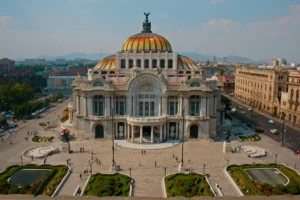
Taking care of your health is paramount when traveling to Mexico:
- Vaccinations: Ensure you’re up-to-date on routine vaccines. The CDC also recommends Hepatitis A and Typhoid vaccines for most travelers.
- Sun Protection: Mexico’s sun can be intense. Remember to regularly apply sunscreen, wear a hat, and stay hydrated.
- Altitude Sickness: If you’re visiting high-altitude areas like Mexico City, you might experience altitude sickness. Take it easy for the first few days to allow your body to adjust.
Food and water
Mexican cuisine is a feast for the senses, but it’s crucial to dine safely:
- Street Food: Street food is a significant part of the food scene. However, hygiene standards can vary. Look for vendors with high turnover, as the food is likely fresher.
- Water: Tap water is generally not safe to drink. Stick to bottled or purified water, even for brushing your teeth.
- Raw Foods: Be cautious with raw or undercooked foods, especially seafood and salads, as they can lead to foodborne illnesses.
Activity-Specific Safety Measures
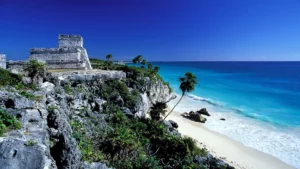
Mexico offers a multitude of experiences, from relaxing on the beach to adventurous mountain hikes. Let’s discuss how to enjoy these activities safely.
Beach
Mexico’s pristine beaches are a major draw for tourists. However, it’s crucial to consider the following points:
- Rip Currents: These powerful currents can pull swimmers out to sea. If caught in a rip current, swim parallel to the shore until you’re out of the current, then swim back to the beach.
- Marine Life: Be mindful of marine life, including jellyfish and sea urchins. Some beaches also have warnings about crocodiles.
- Sun Protection: The sun can be strong on the beach. Use a high-SPF sunscreen, and reapply regularly.
Hiking Safety
Excellent hiking options can be found in different landscapes. Yet keep in mind:
- Plan Ahead: Research the trail thoroughly. Check the weather forecast, and inform someone of your plans.
- Prepare: Ensure you have the right equipment, including a map, compass, first-aid kit, and adequate food and water.
- Stay on Marked Trails: Venturing off-trail can lead to dangerous situations!
Historical Sites
- Respect Rules: These sites often have specific rules to preserve the artifacts. Follow them strictly.
- Beware of Scams: Be wary of unofficial tour guides offering their services.
Personal Belongings
- Valuables: Avoid flashing expensive jewelry, gadgets, or large amounts of cash. Utilize hotel safes for your valuables when possible.
- ATMs: Use ATMs in well-lit, secure locations, and be mindful of anyone watching you.
- Travel Documents: Keep your passport and travel documents secure at all times. It’s also a good idea to have copies of these documents in case they get lost or stolen.
Navigating Local Laws and Regulations in Mexico
Mexico, like any other country, has its own set of laws and regulations. And as a visitor, it is your responsibility to understand and respect them:
Drug Laws
Mexico has strict drug laws, and possession of illegal substances can lead to severe penalties, including imprisonment. It’s crucial to avoid illegal substances entirely during your visit.
Drinking Laws
The legal drinking age in Mexico is 18. While alcohol is widely available, public intoxication is frowned upon and can lead to trouble with local authorities. Consume alcohol responsibly, and avoid drinking and driving at all costs.
Wildlife and Environmental Laws
Mexico is home to diverse flora and fauna, some of which are protected by law. Therefore, avoid buying souvenirs made from endangered plants or animals. Additionally, littering is punishable by fines, so always dispose of your trash properly.
Respecting local culture and customs
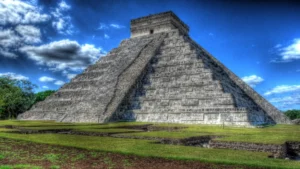
Respecting local culture and customs goes a long way toward ensuring a safe and enjoyable experience:
- Dress Appropriately: While beachwear is acceptable along the coast, more conservative attire is appreciated in inland areas, particularly in churches and temples.
- Language: Although English is spoken in many tourist areas, learning a few basic Spanish phrases can be helpful and respectful.
- Tipping: Tipping is customary in Mexico, typically around 10-15% in restaurants.
- Photography: Always ask for permission before taking photos of people, especially indigenous groups.
Women’s Safety
While Mexico is generally safe for women travellers, it’s important to take additional precautions:
- Dress Appropriately: Dress modestly, especially when visiting religious sites or less touristy areas.
- Be Aware of Your Surroundings: Avoid walking alone at night, particularly in deserted or poorly lit areas.
- Trust Your Instincts: If something doesn’t feel right, trust your instincts and remove yourself from the situation.
LGBTQ
Mexico is increasingly open to LGBTQ travellers, particularly in larger cities and tourist destinations. However, attitudes can vary, especially in rural areas. Research your destination thoroughly, be aware of local attitudes, and exercise discretion in less tolerant areas.
Final Thoughts
Embarking on a journey to Mexico offers the potential for an enriching, unforgettable experience. With its awe-inspiring landscapes, vibrant cultural tapestry, and mouth-watering cuisine, Mexico is a destination that truly offers something for every traveller. But to fully enjoy its charm, safety should be at the forefront of your travel planning.
While this guide has detailed various safety considerations and precautions, it’s important to remember that most visitors have enjoyable and incident-free experiences. The key is to be informed, vigilant, and respectful of local laws and customs. Doing so not only ensures your safety but also enhances your overall experience.
As you navigate through the bustling markets of Mexico City, unwind on the serene beaches of Tulum, explore the ancient ruins of Teotihuacan, or savour the spicy flavours of a traditional mole, let these safety guidelines be your compass. They are not designed to incite fear, but to equip you with the knowledge necessary to handle any situation you may encounter.
So, as you get ready to pack your suitcase, remember that your attitude will shape your journey. Embrace the adventure with open-mindedness, respect, and a sense of curiosity. Learn a few phrases in Spanish, indulge in the local culture, and create connections with the welcoming local people.

